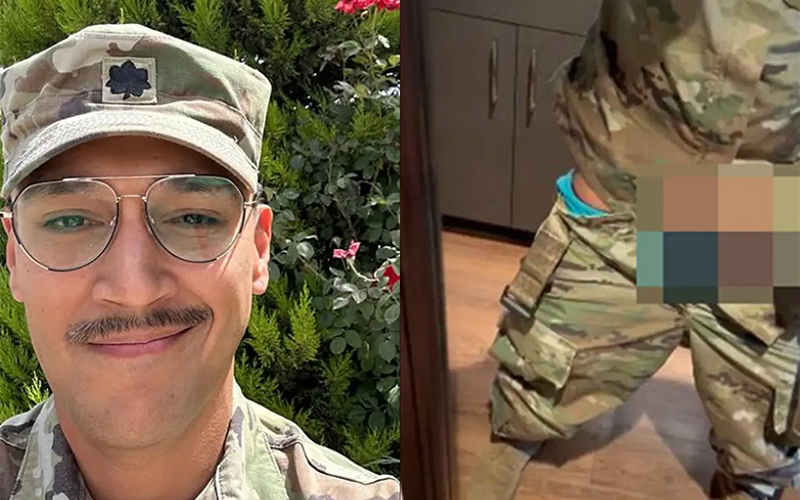The Time Has Come
A new president, a new Congress and increased public support means ''Don't Ask, Don't Tell'' is near the end. Right?
by Sean Bugg
March 4, 2009
The news out of Kansas really shouldn’t have come as a shock. It was a new version of an old story.
In February, the Kansas City Star reported that Kansas Army National Guard Specialist Amy Brian was severed from the service after a civilian co-worker launched a campaign to out her – a campaign that included anonymous e-mails to her chain of command and claims that Brian had been seen kissing a woman in the check-out line at Wal-Mart.
Score another victory for ”Don’t Ask, Don’t Tell,” another loss for military readiness and the gays and lesbians who wish to serve their country honorably and honestly.
Since the passage of ”Don’t Ask, Don’t Tell” (DADT) 15 years ago – a legislative rebuke to President Bill Clinton’s promise to end the military practice of barring gay servicemembers – the number of discharges has reached into the thousands, at a cost of more than $400 million, and at a time of two wars when the nation’s volunteer military has struggled to maintain recruitment levels. With the one hand, the military discharges much needed Arabic linguists because they are found to be gay, with the other it relaxes recruitment standards to allow convicted felons and violent criminals to fill out the ranks.
But 15 years is a long time, long enough that the number of Americans supporting the right of gays and lesbians to serve openly in the military has risen from below 50 percent in 1993 to more than 75 percent in 2009. The country has moved – the question is whether the government and military will follow.

Dr. Nathaniel Frank
(Photo by Matthew Brown)
Given the exuberance following the election of President Barack Obama, many saw an opportunity for progress on a number of GLBT priorities that had stalled, from employment discrimination and hate crimes to DADT. Obama indicated during the campaign his support for overturning the military ban, and the election of a more solidly Democratic Congress would seem to buttress that.
But, politics being politics, it’s not as simple as it might seem.
When Obama press secretary Robert Gibbs reiterated the president’s support for ending the ban, he set off a minor media storm of punditry that questioned whether the new administration was about to make the same ”mistake” as Clinton – namely, taking on a hot-button gay issue early in his term. MSNBC’s Chris Matthews went directly to questions about submarines and homosexuality, an uneasy reminder of the 1993 Senate hearings led by Georgia Sen. Sam Nunn that stacked the deck against gay servicemembers with sexual panic and paranoia. And some in the GLBT community sense a pulling away from the issue in repeated remarks from administration and congressional sources about the need for more study and consultation on the issue.
Still, says Nathaniel Frank, a senior research fellow at the Palm Center, ”It feels like the stars are falling into alignment.”
Frank, who broke the news of the Army’s dismissal of Arabic-speaking linguists under DADT, has published a new book that details the folly and costs of the anti-gay military policy, Unfriendly Fire: How the Gay Ban Undermines the Military and Weakens America.
”It’s one thing for people who study an issue to understand and absorb what the research says,” Frank says. ”The rest of the world is not studying these issues.”
Frank acknowledges that the opinion of military leadership will be an important part of getting DADT repealed, even as the military has been the source of the most popularized rationales for the ban – including, says Frank, the fabrication of ”unit cohesion” as a reason to keep open gays out of the military, a fabrication he documents in his book from interviews with high-ranking military officials.
”[Unit cohesion] is a story that was created literally in backrooms of the Pentagon in consultation with members of the religious right to create a dishonest strategy…when in fact the rationale of the policy in reality has always been moral opposition to homosexuality.”

Congresswoman Ellen O. Tauscher
Other DADT supporters have claimed that a time of war is not a time to make a change in military policy.
”There’s a lot of research that it’s better to make the change during war rather than in peacetime,” he says, noting that soldiers under fire in foxholes are unlikely to be focused on the orientation of fellow soldiers. ”[It’s] during peacetime when this tends to be an issue.”
Frank makes the case that the costs of DADT are too high for an open society, both in terms of national security and the careers of gay and lesbian servicemembers – and for what it means to live in a country that ”punishes people for telling the truth.”
On Monday, March 2, at a Center for American Progress panel at which Frank discussed his book, Rep. Ellen Tauscher (D-Calif.) announced her re-introduction of the Military Readiness Enhancement Act, a bill that would repeal DADT.
”We have a military that is truly the finest in the world, but we must tear down one final, last barrier,” said Tauscher, who also spoke to the need for moving forward now with the effort to repeal the ban.”It is no longer a question of ‘if’ we will change this law. It is just a question of ‘when.’ Many have asked, ‘Why now?’ And I have always said, ‘There is no right time to right a wrong. But there is always time to right a wrong.”’
As for the prospects of passing the bill in both houses of Congress, Tauscher said, ”The alchemy has come together for us where we have all the pieces that we need. Now we have to galvanize the will of the American people.”
Tauscher’s bill isn’t the only path to repeal – or the status quo. Aubrey Sarvis, executive director of the Servicemembers Legal Defense Network (SLDN), points to the upcoming authorization hearings for the 2010 Defense Department as the likely flashpoint for the issue, and that supporters of the ban will make it a topic at the hearings.
”They will try to frame the issue and create a visible and public wedge between the president and the Pentagon leadership if they can,” says Sarvis, who urges the Obama White House to ”play offense as well as defense” by including a recommendation on DADT repeal in its authorization recommendations.
The White House released a statement Monday after Tauscher’s bill was introduced: ”The President supports changing Don’t Ask Don’t Tell. As part of a longstanding pledge, he has also begun consulting closely with Secretary Gates and Chairman Mullen so that this change is done in a sensible way that strengthens our armed forces and our national security.”
Human Rights Campaign lobbyist David Stacy, the organization’s point person on DADT, says that current public support for repeal reflects ”tons of great advocacy work” and feels ”very reassured” that the White House has made repeal a priority.
”We feel that we’re poised for all of the pieces to come together,” he says, while noting that an exact time frame for movement from the administration is not necessary, although ”it’s reasonable to expect that within the next month or two.”
While GLBT groups such as SLDN and HRC are optimistic that the time for change is ripe, there are no done deals until the legislation is passed and signed. For the community, some patience may be warranted – but action and support are what’s needed to usher in a change that’s been a long, long time coming.
Managing Editor Will O’Bryan contributed to this story.
Gay Army Reserve Officer in Uniform Sex Video Scandal
Lt. Col. Adam Harmon has reportedly been fired from his position as a DEI specialist after posting sexually explicit content to social media.
By John Riley on April 8, 2025 @JRileyMW
Lt. Col. Adam Harmon, a U.S. Army Reserve Officer who works as a diversity, equity, and inclusion specialist was fired after allegedly posting gay porn of himself in uniform, including during overseas deployment.
The gay 44-year-old West Point graduate and military intelligence officer allegedly shared workplace fantasies and X-rated content to the alt X account @franzkafka2007 and requested that other content creators collaborate with him.
According to the New York Post, Harmon, who has worked as DEI lawyer outside of the military, operated the alt account for the past six years and posted as recently as November 2024.
Support Metro Weekly’s Journalism
These are challenging times for news organizations. And yet it’s crucial we stay active and provide vital resources and information to both our local readers and the world. So won’t you please take a moment and consider supporting Metro Weekly with a membership? For as little as $5 a month, you can help ensure Metro Weekly magazine and MetroWeekly.com remain free, viable resources as we provide the best, most diverse, culturally-resonant LGBTQ coverage in both the D.C. region and around the world. Memberships come with exclusive perks and discounts, your own personal digital delivery of each week’s magazine (and an archive), access to our Member's Lounge when it launches this fall, and exclusive members-only items like Metro Weekly Membership Mugs and Tote Bags! Check out all our membership levels here and please join us today!
The Magazine
-
Most Popular
 Gay Army Reserve Officer in Uniform Sex Video Scandal
Gay Army Reserve Officer in Uniform Sex Video Scandal  Gay Porn Star Tim Kruger Dead at 44
Gay Porn Star Tim Kruger Dead at 44  WorldPride Warns International Trans Visitors About Travel Risks
WorldPride Warns International Trans Visitors About Travel Risks  WATCH: Ad Attacks Senator Over Trans Athlete Vote
WATCH: Ad Attacks Senator Over Trans Athlete Vote  Charges Dropped in Nancy Mace Assault Case
Charges Dropped in Nancy Mace Assault Case  'Porn Star University' Started by Gay-for-Pay Creator Andy Lee
'Porn Star University' Started by Gay-for-Pay Creator Andy Lee  Awesome Con Gallery: Rage Gear Studios
Awesome Con Gallery: Rage Gear Studios  Gay Congressman Chris Pappas Launches U.S. Senate Bid
Gay Congressman Chris Pappas Launches U.S. Senate Bid  Public Health Nightmare: CDC Shuts STI Lab, Fires Its Scientists
Public Health Nightmare: CDC Shuts STI Lab, Fires Its Scientists  Greece to Ban Surrogacy for Gay Male Couples
Greece to Ban Surrogacy for Gay Male Couples
 WorldPride Warns International Trans Visitors About Travel Risks
WorldPride Warns International Trans Visitors About Travel Risks  Charges Dropped in Nancy Mace Assault Case
Charges Dropped in Nancy Mace Assault Case  Gay Army Reserve Officer in Uniform Sex Video Scandal
Gay Army Reserve Officer in Uniform Sex Video Scandal  WATCH: Ad Attacks Senator Over Trans Athlete Vote
WATCH: Ad Attacks Senator Over Trans Athlete Vote  John Grant Happily Talks About Everything and Everyone
John Grant Happily Talks About Everything and Everyone  Conversion Therapist Sexually Abused Male Clients
Conversion Therapist Sexually Abused Male Clients  Public Health Nightmare: CDC Shuts STI Lab, Fires Its Scientists
Public Health Nightmare: CDC Shuts STI Lab, Fires Its Scientists  Win Tickets to DeathbyRomy
Win Tickets to DeathbyRomy  Broadway's Grand and Glorious 'Purpose'
Broadway's Grand and Glorious 'Purpose'  'Glengarry Glen Ross' Is An Abusive Night of Theater
'Glengarry Glen Ross' Is An Abusive Night of Theater
Scene
Metro Weekly
Washington's LGBTQ Magazine
P.O. Box 11559
Washington, DC 20008 (202) 638-6830
About Us pageFollow Us:
· Facebook
· Twitter
· Flipboard
· YouTube
· Instagram
· RSS News | RSS SceneArchives
Copyright ©2024 Jansi LLC.







